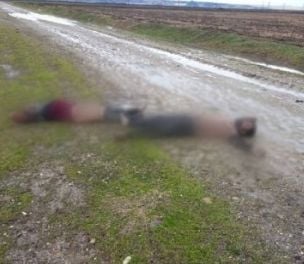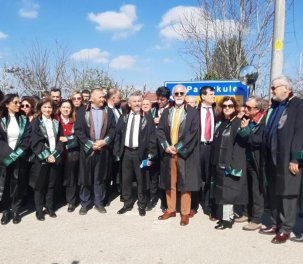Photos: bianet
Click to read the article in Turkish
"I am so sorry for the children... They came to our coffee house the other day, the boy is one year old, his brother is one-and-a-half, sister is three years old. They were all wet. That morning was so cold. There was hoarfrost. The children didn't have bootees, we brought them from home. I gave them sweets from the coffee house, they ate and wanted again. They were miserable, daughter. If only they would come in the summer... The river almost dries here in the summer. They would just cross, they couldn't know..."
The owner of the coffee house in Saçlımüsellim, a border village in the northwestern Edirne province, gives us tea and tells what has been happening since the latest migration flow began.
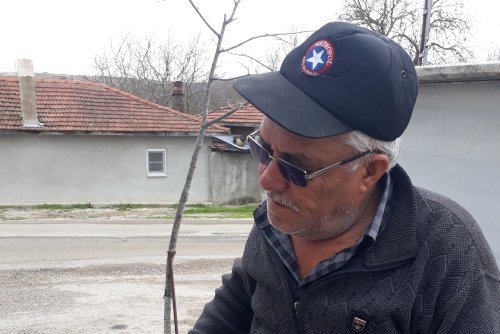
Saçlımüsellim lies near the Meriç (Evros, Maritsa) River, which forms part of the border between Greece and Turkey and has become a common route for refugees trying to cross into Europe.
The situation in all villages near the Evros River is more or less the same: Wooded areas between the river and fields are full of tents and sunshades.
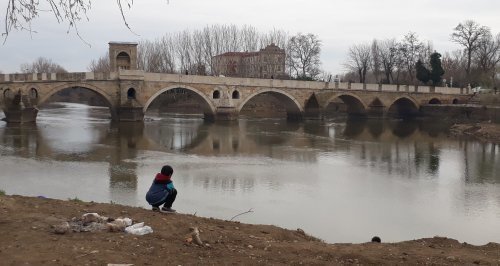
Refugees have been staying in the area in the cold, without food and toilet since February 28, when Turkey announced that it will no longer try to stop refugees from reaching Europe despite a 2016 agreement with the European Union (EU) on stopping the refugee flow. Ankara's move came after an airstrike in northwestern Syria that claimed the lives of 33 soldiers.
'Same game' all along the border
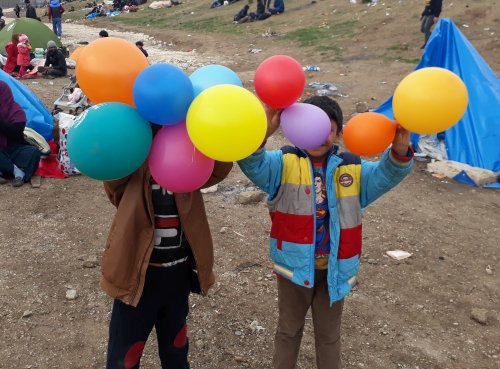
While some refugees are waiting for the night to cross into Greece, some have lost their hopes and are preparing to return.
The "game" is the same all along the border: Among refugees who cross into Greece risking their lives, those caught by the police or soldiers are sent back to Turkey after being beaten and their money was stolen.
People from Doyran, a nearby village on a narrow point of the river, say that some people who crossed into Greece last night were sent back today.
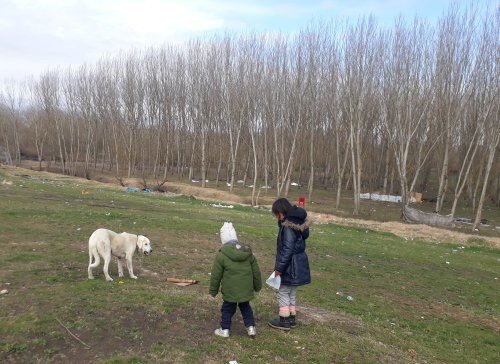
"They came near the mosque this morning. They robbed the men, took money, belongings, whatever... The Greeks also beat them and sent back. Only their underpants left. This is sin..."
Announcements in Arabic also come from the other side of the river, saying, "Don't come here, don't cross to this side," according to the villagers.
'Many have crossed'
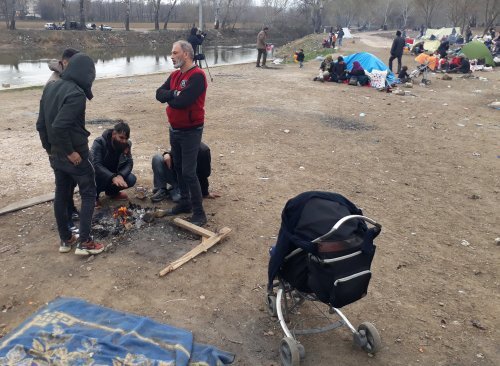
Yet villagers say most refugees manage to stay in Greece, avoiding being caught. "Many people went, these places have emptied."
In fact, the village is not as crowded as it was a week before. The villagers say it was so crowded "like İstanbul's bus terminal."
We encounter a family from Afghanistan, who were sent back from the border. When we ask what they will do from now on, they reply, "We don't know."
"These are beginners, they tried to cross in the daytime. No way, you should go at night," the villagers say behind them.
Mita Abbasi (19), a textile worker from Afghanistan, says she is fed up with waiting here without food, water and toilet, is returning to İstanbul, saying, "Enough is enough."
.jpg)
'The Germany dream'
Another and larger group stays in a makeshift camp on the shore of the Tunca (Tundzha) River, a tributary of the Evros in Bulgaria and Turkey. Most of them are from Afghanistan but there also people from Pakistan, Morocco, Algeria, Somali, Palestine and Syria are among them.
All of them were working at textile workshops in different parts of the country, such as İstanbul, Kayseri and Bayburt. Their complaints are also the same: "We work 12 hours a day. They either don't give us our money, or the salaries are very low, not enough... There is no insurance anyway..."
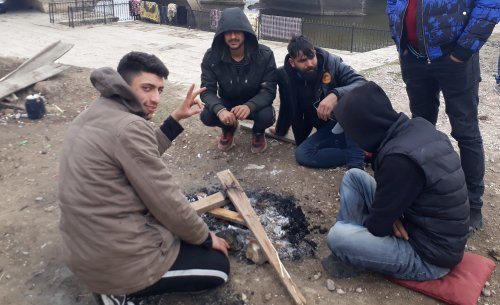
Most people whom we talk to say they managed to cross the river at least once but have been sent back. All of them say they will try again. The last stop they aim is also the same: Germany.
Ibrahim says, "Police beat us with batons, I was injured in the knee. Then they took our clothes, belongings, money and sent us back here. We don't want to go to Greece anyway, they should let us go to Germany."
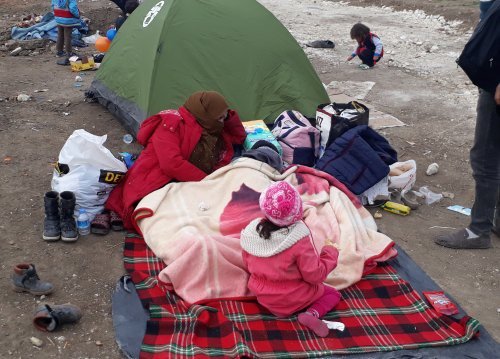
His brother says, "Turkey is good. But we can't make a living here. We don't have children but [the money we make] is still not enough. The rent is 1,500 lira [~245 US dollars]. After electricity, water bills and grocery, nothing is left. It is impossible to start a family. Otherwise, we don't want to go, we are comfortable in Turkey, we don't have a problem."
"The weather is ice cold. When it goes dark, I pray, 'God, don't give us rain.' It rained a lot yesterday. They say sleep here [pointing to the muddy ground]. How can I sleep here?"
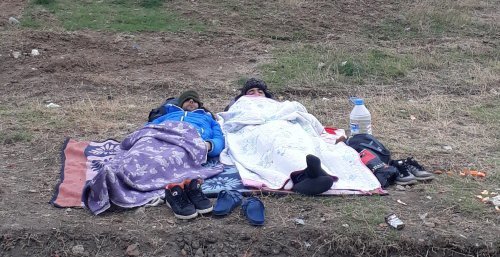
'We'll try again'
Elham Majid (31) from Iraq also managed to cross into Greece, with wife and two children. Yet the end of the story was the same: "They confiscated everything; passports, driver's license, money, clothes... they sent [us] back from the border. We have nothing left. I don't have any identity card right now. But we will try again, we will surely go..."
Also having worked at a textile workshop, he had the same problems in İstanbul: "Otherwise I liked İstanbul. I loved my friends. Our neighbors cried a lot when we were leaving."
.jpg)
Thousands of people, the same story: First running from the war, then from poverty. The risk they take for that is great.
As we are leaving the camp, fires have started near every tent, giving off an intense smell of smoke.
'Traffickers are in the neighboring village'
Our last stop is the barbed wires on the border, where "the action takes place."
Three young people from Somalia jumped into the Evros but were caught. They are still bare feet, trying to get warmer with blankets.
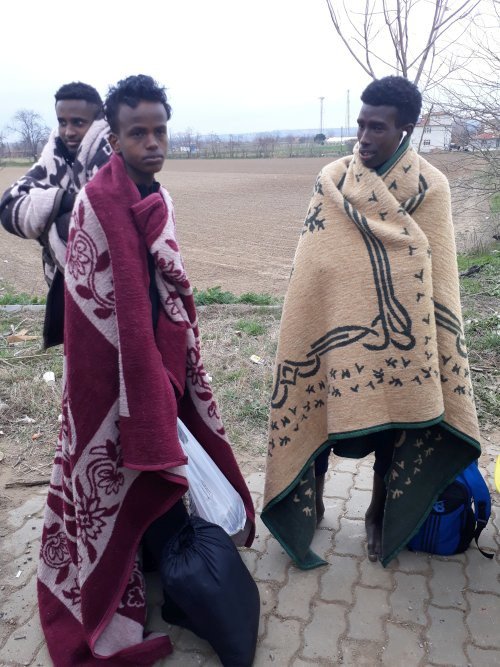
A man is hugging them, posing for European journalists. He is boasting "how many times he made them cross."
He sings another tune when he sees journalists from Turkey: "I am from Edirne. I came here to look at what happened here."
When we ask whether they are human traffickers around, he says the same thing as other villagers: "Not in our village, there are in other villages."
.jpg)
As it gets dark, the walk to the barbed wire begins. Some are returning, saying that they return to get food and will wait near the barbed wire for all night. There are even "refugees from Turkey" among them.
Refugees don't seem to give up on their dreams of going to Germany. It is unknown how long one-year-old toddlers can bear these conditions. (AS/VK)






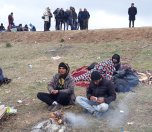
-132.jpg)
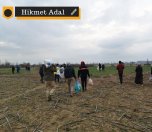
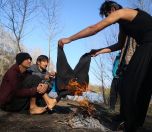
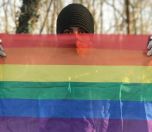

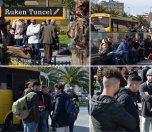
-132.jpg)
